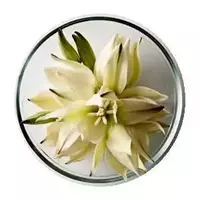Yucca flowers

Yucca is classified as evergreen tree plants, which belong to the subfamily of monocotyledonous Agave from the Asparagus family. The woody stem in some yucca species is branched, with linear lanceolate leaves with sharp ends forming at the ends of the trunk or branches. Sometimes the stem is practically absent, and the plant itself is a bunch of rather large leaves of xiphoid shape.
As a rule, this heat-loving plant blooms at night, revealing beautiful white or cream, bell-like flowers. Yucca flowers are quite fragrant - they resemble the smell of expensive soap in some way. Fruits can appear only in those species of yucca that grow in the wild, since pollination is produced thanks to butterflies.
Interestingly, due to the numerous medicinal properties of yucca, the flowers of the plant are used to obtain extracts. In addition, the fragrant petals of yucca flowers are very pleasant to taste, so they are used for culinary purposes. The first to appreciate the flowers of this plant were the Indians: they added the collected petals to soups and vegetables.
The aroma and taste of yucca flowers can vary depending on the variety of the plant, as well as its age: older specimens, for example, can mustard. In general, fresh yucca flowers are quite elastic, dense and a little crisp, they taste like a mixture of green beans and inner artichoke leaves.
Most recipes for yucca flowers use eggs - these two components combine perfectly. For example, yucca flowers fried in batter, a variety of omelettes, the so-called frittatas and huevos, are very popular in the homeland of this plant. In addition, they are often added to tomato soups in crushed form.
Yucca species
Today, there are a large number of wild yucca species that are found in Central America and are also cultivated in southern European regions. Meanwhile, in our country in indoor cultivation, the most common are Yucca treculeana, Yucca rostrata, Yucca aloelista, Yucca radiosa, Yucca elephantipes and Yucca filamenta.
Benefits of yucca
The benefits of yucca (not only flowers, but the whole plant as a whole) for human health lie in its ability to activate the body's functions, cleanse it, increase blood pressure, and also have a beneficial effect on the respiratory tract.
As practice shows, the benefits of yucca are also obvious in the fact that with its help they relieve inflammation and relieve pain in gout and arthritis. The natural saponina substances that are present in this plant are characterized by steroid properties without causing side effects.
yucca flowers 0 kCal
Energy value of yucca flowers (Ratio of proteins, fats, carbohydrates - ju):
Proteins: 0 g (~ 0 kCal)
Fats: 0 g (~ 0 kCal)
Carbohydrates: 0 g (~ 0 kCal)
 Español
Español Français
Français Português
Português Русский
Русский 简体中文
简体中文 繁體中文
繁體中文 日本語
日本語 한국어
한국어 العربية
العربية Türkçe
Türkçe Қазақ
Қазақ Deutsch
Deutsch Italiano
Italiano Українська
Українська
